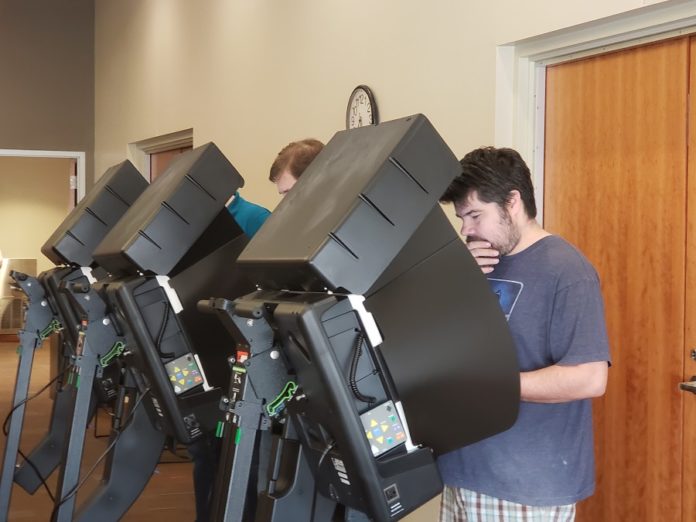Kansas is one of two states nationwide that haven’t submitted plans for spending millions in federal money for protecting voting systems, leading a secretary of state candidate to question the competency of current secretary Kris Kobach.
Neither Kansas nor Montana has filed the required planning documents explaining how the states plan to spend their share of $380 million that Congress appropriated this year for improving and protecting election systems. Kansas’ share is $4.4 million with a $219,000 match from the state.
The deadline for filing the documents was July 16, but the federal Election Assistance Commission gave Kansas an extension until the end of September. State officials believe they will have a plan filed by the end of next week.
Democratic Secretary of State candidate Brian McClendon went on Twitter and criticized the state’s slowness under Secretary of State Kobach.
“Too busy to protect our election, Sec. Kobach?” McClendon said in a tweet. “Feds are allocating $$ to states to improve election cybersecurity & KS is AWOL.”
In a subsequent interview, McClendon blamed Kobach for failing to move quicker on filing plans for how the federal money will be used for the state’s election systems.

“Kobach is running this, and Kobach — basically by choice or by incompetence — slow-rolled a really important grant opportunity and in so doing is missing a big opportunity to improve his office,” McClendon said in an interview.
“If this is how he’s going to run the state, we’re in deep, deep trouble,” he said.
Kobach’s campaign deferred comment to Bryan Caskey, director of elections for the secretary of state’s office.

Caskey said the secretary of state’s office is following the rules and has been in contact with the Election Assistance Commission, which is headed by former Johnson County Election Commissioner Brian Newby. Caskey emphasized the state had been given an extension to get the planning documents filed.
“We just wanted more time to decide how we’re going to spend the money,” Caskey said. “The current secretary is not going to be in office for most of the time that money is going to be used. We’re just trying to put in place a plan we can do now and try to predict what the next secretary will want to do.”
He said the money from the grant is supposed to last for five years. He said the federal money isn’t intended to address election issues in just 2018.
“We’re trying to be judicious about how and when that money will be allocated,” Caskey said.
McClendon argues that lost time means it will be hard to spend any of the grant money to improve the state’s election system this year.
“Time is absolutely of the essence,” McClendon said. “You need to spend some of it right now, and they’re delaying the start of spending some of it.”
There’s still another issue the state needs to iron out. Federal officials said the state still hasn’t set up an account allowing it to draw down the money coming to the state. Until that issue is resolved, the grant money can’t be transferred to the state.
Caskey said the state has an account, but there’s been a technological snafu. He expects the issue to be fixed by Monday.
McClendon’s Republican opponent, state Rep. Scott Schwab, was empathetic with the plight of the secretary of state’s office.
“Until they pass the due date, I don’t think they’ve done anything wrong. You don’t always have to be first,” Schwab said. “You want to use as much runway as they give so you get the plan right.”

Schwab said the secretary of state’s office has to develop a plan that will be executed by a secretary of state who hasn’t been sworn in yet.
“That office is in a tough dynamic,” Schwab said. “They want to make sure they have as much latitude as possible so they don’t offend whoever the next boss that’s coming in.”
Earlier this year, Congress approved $380 million for protecting the country’s voting systems from cyberattacks. It was the first appropriation of new funds under the Help America Vote Act since fiscal year 2010.
This week, the Election Assistance Commission revealed how most states are going to spend the money they will receive under the program. There are plans posted for most states on the commission’s website.
There are some states beyond Kansas and Montana whose plans are not posted on the commission website because they are being revised, federal officials said.
Here’s how states are planning to spend the money, according to the Election Assistance Commission:
- Forty one states plan to spend money upgrading election cybersecurity.
- Thirty four states will be spend money on new voting equipment.
- Twenty nine states will spend money improving voter registration systems.
- Twenty four states will spend money for post-election audits.
- Eighteen states will spend money on election-related communications efforts
Missouri, for instance, wants to use its $7.3 million for training, upgrading its centralized voter registration system and bolstering information technology staff assistance for local election authorities, among other things.
Iowa, meanwhile, plans to use its $4.6 million for election administration and hardening election security. About 60 percent of the money will go to providing cybersecurity in Iowa’s 99 counties.
Caskey said his office has a draft of a plan and it would not be made public until after it’s submitted to the Election Assistance Commission.
There are many possibilities for spending the money. They including buying more voting machines that produce a paper record as well as paying for election audits that will be required by state law in 2019.













